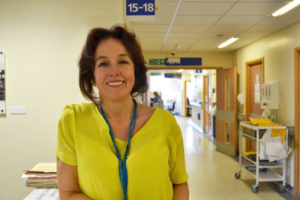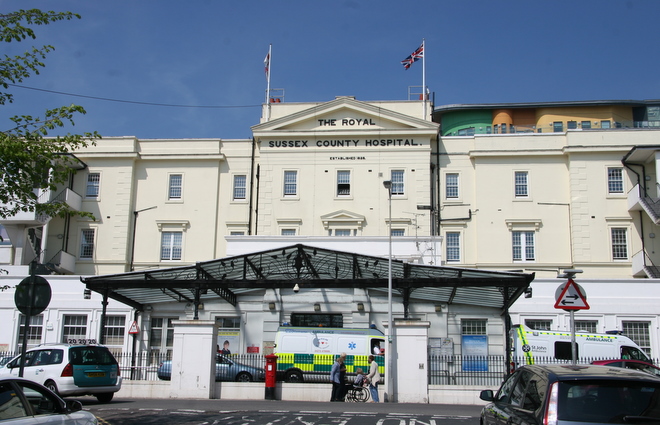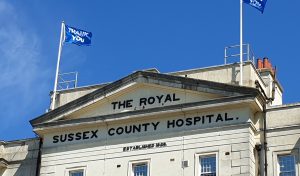Doctors at the Royal Sussex County Hospital in Brighton have sent a letter raising serious safety concerns with NHS trust chief executive Dame Marianne Griffiths.
The contents of the letter to the University Sussex Hospitals boss have been shared with the BBC and the HSJ (Health Service Journal).
The letter from consultants has been described as a warning about serious clinical safety concerns and burn-out affecting staff.
And they call for some operations to be carried out elsewhere, adding that intensive care staff and theatre nurses are suffering from depression and post-traumatic stress.
University Hospitals Sussex, the trust that runs the Royal Sussex and half a dozen other hospitals, said that it was aware of the pressures set out in the letter from the consultants.
The BBC said that senior doctors’ concerns also included a “downward spiral of losing many experienced staff” and the trust said that it was redeploying staff and had increased pay rates for extra hours.
The broadcaster said that operating theatre staffing levels were “dangerously low”, according to consultants, and “morale has reached crisis point”.
The hospital management was described as “failing” as well as “dysfunctional, uncaring and incompetent” by the consultants.
And, the BBC said, the letter accused trust chiefs of leaving theatre nurses unsupported, adding that there was “no compassion, no understanding for staff’s wellbeing, mental state, tiredness and exhaustion”.
HSJ said that the consultants had warned about urgent aneurysm repairs and cancer operations were being repeatedly delayed due to staffing issues.
And they added that delays to time-critical emergency and trauma cases were creating “an extremely unsafe situation”.
According to the report in the HSJ, staff were “trapped” at work as operating sessions ran late and anaesthetists were forced to look after patients in recovery, delaying the next operations.
The consultants even questioned whether it was safe for the Royal Sussex to remain open as a trauma tertiary centre.
They indicated that staff were willing to work in private hospitals because conditions there were better – and there was also the high cost of living in Brighton.
Staff – especially nurses – may simply be finding the rewards of working in the NHS are simply not worth it for the pressures involved.
David Liley, chief executive of the patients’ group Healthwatch Brighton and Hove, said: “There seems to be a rift emerging between the people who deliver care and their NHS managers.
“If consultants and doctors are raising safety concerns, we all need to listen. And given those safety concerns, the CQC should be carrying out a full inspection of the new larger trust.”
Mr Liley said that part of the case for the merger earlier this year, which created the bigger organisation, was to enable the sort of flexibilities now being requested by doctors.
He added that this was a test of whether the pre-merger promises could be delivered.
University Hospitals Sussex medical director Rob Haigh said: “Patient safety is our number one priority and our teams have made huge efforts to ensure our resources are focussed on the most clinically urgent patients, including the need to prioritise emergency patients.
“We are aware of the pressures the letter describes through our normal safety and operational processes. We have continued to meet with our theatre and surgery leads to listen to the issues and explore ways in which we can ease the unprecedented pressure our staff are facing as a result of the pandemic.
“We are also continuing to recruit new staff, including from overseas, as well as provide extra support for our current teams and have increased our pay rates for those staff who want to undertake extra work.

“To ensure we continue to provide safe care, we have also redeployed staff from a range of areas to support the pressure on critical services, including surgery and intensive care, and regrettably this has meant we have had to postpone a number of planned procedures.
“We will continue to work with our staff to listen to their concerns, discuss their suggestions and explore what further steps we can take.
“Throughout these challenging times there has continued to be a positive relationship between clinical staff and trust management.
“We will continue to meet with our staff to listen and act upon any concerns raised as well as looking at ways we can support staff and help ease the unprecedented pressures our hard-working teams have been facing since the pandemic began.
“The last 18 months have been incredibly tough. NHS workforce shortages have been widely documented across the country and we have recruited more staff including a recent successful international recruitment drive which has delivered more than 100 new nurses.
“We continue to work together to deliver the best possible care for our patients”.










Between N Y Eve abd Feb 3 this year I was twice an RSCH inpatient & I can echo the alarm raised here.
Throughout January I went froom A&E into 4 or 5 different wards as efforts were made to separate covid from non covid patients. What was obvious was a loss of nurses. The hospital seemed run by very young health workers fresh from two weeks training instead of trained professionals. And some were quite rude.
I did not ever feel safe, nor was I.
New Year’s Eve saw a bag of fluid blow my arm up instead of rehydrate my body via a vein. Covid affected my muscles so I could not stand long enough to even use the commode in the back half of January but these health workers demanded I walk to the loo cause nobody said I couldn’t. Mistakes were made with my transplant/antibiotic drugs by actual nurses (which I caught however ill I was).
One health worker slammed the bed peddle down to make me sit upright with ny legs straight. It damaged my kneecaps – forced them sideways. They wanted me to eat that way and not sat on the edge of the bed using the table.
The impatient resentment of patients MAY be down to covid burnout but it has brewed over years. Or is it a Brighton issue? The doctors need nursing support for patients but it is in a parlous state. One doctor I had shrieked at me over a pain killer change & it was obvious burnout behaviour in my eyes at the time.
Now the uni intakes will see students queuing at A&E because they have no local GP….